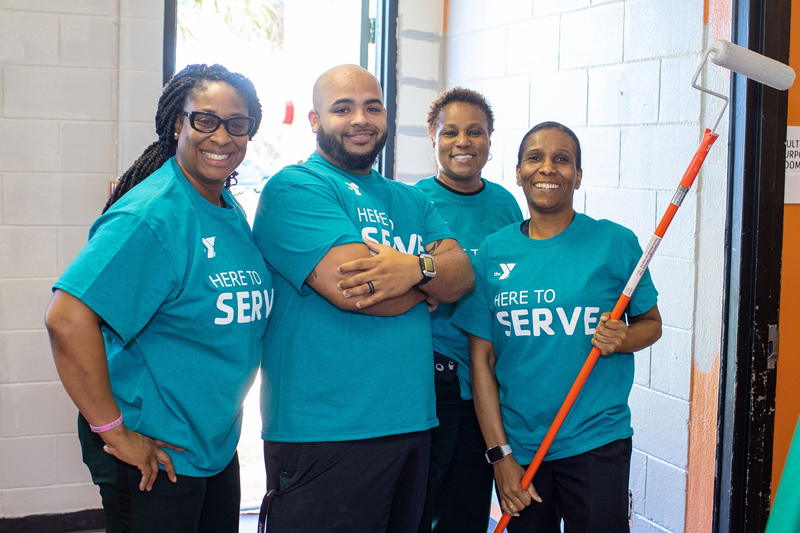A timeline of milestones by African-Americans in the YMCA
1850 – 1900
The first YMCA created by the black community began less than two years after Thomas Sullivan bought the movement to American shores. Anthony Bowen, a former slave and the first black employee in the U. S. Patent Office established the first YMCA to serve the African-American community in his Washington, D. C, home in 1853.
In 1867, E.V.C. Eato of New York City became the first black delegate to join the annual Y convention. In the mid-1870s, YMCA leaders called for a national staff member to work with African-American communities. Unfortunately, the first man selected for the position was white and a former general in the Confederate Army.
The concept of Black YMCA’s manifested into tangible growth. In 1896, there were 60 Black YMCA’s identified by the organization.
When the national YMCA office created a “Colored Men’s Department” in 1890, an African American was hired to serve black communities. He was William Hunton, the son of a slave who had purchased his own freedom. A Canadian native, Hunton joined the national staff from a black YMCA in Norfolk, VA, which he led for two years.
1900 – 1950
In 1915, Carter G. Woodson, a University of Chicago alumnus, arrived in Chicago to attend a national celebration of the 50th Anniversary of emancipation sponsored by the state of Illinois. Inspired by this three-week celebration where thousands of African Americans had traveled from across the country to see exhibits that highlighted the progress of their people since the end of slavery, Woodson met at the Wabash Avenue YMCA in Chicago with a small group and formed the Association for the Study of Negro Life and History (ASNLH). This began the foundation that would create Negro History and Literature Week, renamed Negro Achievement Week, later Negro History Week, and eventually Black History Month
For the next 25 years, Hunton and his colleague Jesse Moorland assembled a staff of talented young men who carried the Y mission to African-American communities around the United States.
By 1924, a total of 28,000 members occupied more than 160 Black Y’s. The Wabash Avenue YMCA in Chicago, IL., gained national recognition. During the YMCA’s 53rd Anniversary Dinner, Booker T. Washington said, “This YMCA building branch for our people will come further, in my opinion, in helping the Negro young man in finding himself, to articulate himself, in its civilization, than any other movement that has been started in the city of Chicago.”
In 1947, Jackie Robinson broke the color barrier and became the first Black major league baseball player. This same year he also became a volunteer boys coach at the Harlem YMCA with fellow coach and teammate Roy Campanella.
1950 – 2000
During the 1960s, many black YMCAs became meeting places and rallying points for the civil rights movement. Dr. Martin Luther King Jr. and Rev. Andrew Young often swam with their families while home from their obligations to the freedom movement.
Black leaders Vernon Jordan, former Atlanta mayor Maynard Jackson, Martin Luther King Jr., and Congressman John Lewis all grew up at the historic Butler Street YMCA in Atlanta, while Andrew Young spent his grade-school days in the Dryades YMCA in New Orleans. U.S. Supreme Court Justice Thurgood Marshall grew up at the Druid Hill YMCA in Baltimore.
As a child, Everett Christmas lived next door to the Montclair YMCA. There, he began his professional YMCA career as a physical director. He later worked in Wilmington, Delaware, and as executive director at the Second Street Youth Center in Plainfield, N.J. Christmas returned to YMCA work in the late 1960s, in leadership positions in Newark and East Orange, N.J. For 16 years, Christmas worked with the YMCA of the USA as a field consultant and trainer. He was also the director of the YMCA Black Achievers Program, which grew from seven to 125 local programs under his leadership. As a core member of the national staff development faculty, Christmas trained thousands of YMCA workers in YMCA history, the Y’s Christian heritage, and diversity. He retired in 1996 and continued to serve as a YMCA consultant, historian, and motivational speaker. He was honored with the YMCA Association of Professional Directors Knebel Award for Distinguished Leadership and named the National YMCA Black Achievers Hall of Fame. He also received a Humanitarian Award from the African American Culture Center of Raleigh, N.C.Portrait photograph of Everett T. Christmas.
In 1971, Leo Marsh started the Black Achievers Program at the Harlem YMCA in New York to recognize adult role models and encourage leadership among African-American youth. Today, YMCA Achievers programs run in 172 YMCAs.
In 1976, Violet Henry became the first woman to be named to a top management position on the YMCA national staff as executive director of the Organizational Development Group. She was responsible for personnel management, corporate planning, and development projects.
In 1986, National Executive Director, Solon B. Cousins, appointed a nationwide task force on how YMCA’s in the Black communities can be better supported, which led to the creation of the National Black Achievers Network.
In 1990, the YMCA of Central Florida Black Achievers was started, working with Black teens.
2000 – Present
In 2002, the YMCA of the USA created the National Diversity Initiative to support the Y Movement in valuing the diversity of all people within its associations and the communities we serve.
The Multicultural Executive Development Institute (MEDI) was created in 2006, the first national executive leader development program targeting staff of color was offered by Y-USA.
In 2015, Kevin Washington became the 14th President and CEO of YMCA of the USA. Kevin was the first African-American to hold the position.
In 2021, Kevin Bolding became the first African-American CEO and President of the YMCA of Central Florida.
